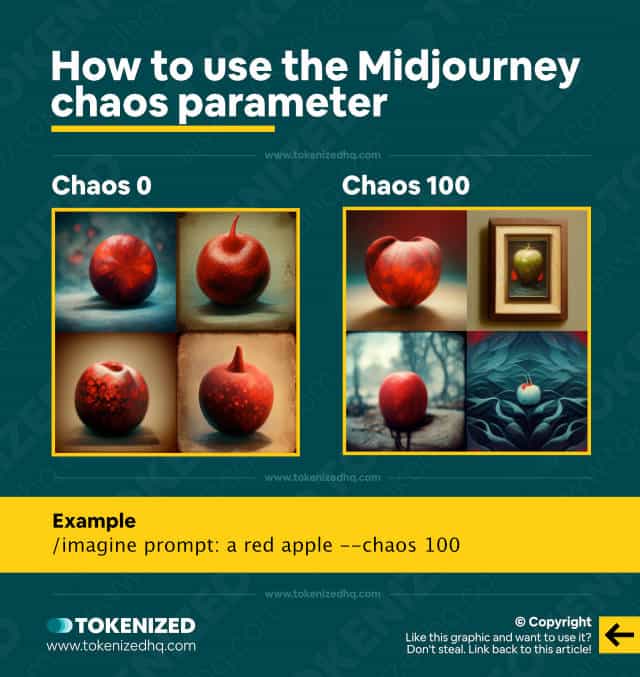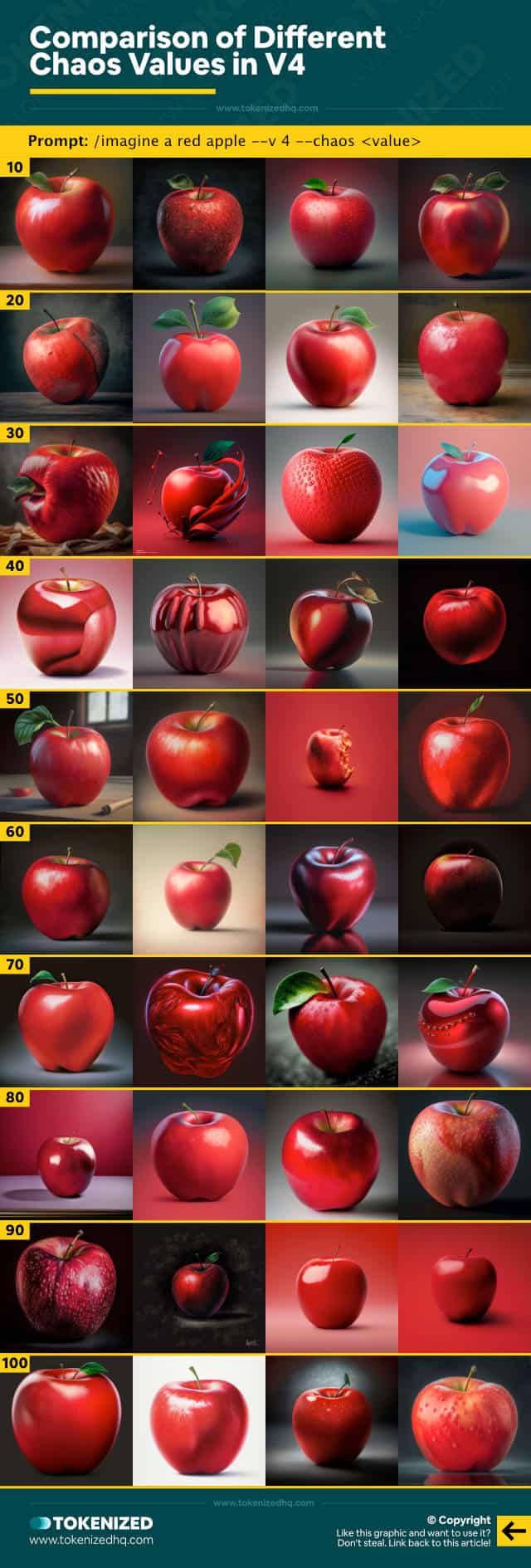Want to know how to use the Midjourney chaos parameter?
Getting into AI art and creating your very first images is incredibly easy thanks to tools such as Midjourney.
However, anyone who’s dug deeper into the technology and its capabilities is well aware of the fact that the very best examples of AI art require much more than just a prompt and some settings.
In this guide, we’ll show you how to use --chaos in Midjourney, which is probably one of the least known parameters out there.
Let’s dive right in.
Table of Contents Show

Like this content? Then share it!
Explained: Midjourney Chaos Parameter
www.tokenizedhq.com
Here’s the answer. Great article by @ChrisHeidorn right here: https://tokenizedhq.com/midjourney-chaos/
How to Use the Midjourney Chaos Parameter

According to the official Midjourney documentation, the --chaos parameter controls how much more varied your results will be.
The parameter supports integer values on a scale from 0 to 100, with higher values favoring more interesting or somewhat unusual images.
On the flip side, this also means that your results become less reliable in terms of composition.
And that makes sense because after all, you’re adding “chaos” into the equation.
So when exactly should you use the Midjourney chaos parameter?
Well, that largely depends on what you are trying to do.
If you’re objective is to re-create a very specific image composition or you have something in mind that you want to re-create, then --chaos will definitely not help you much.
However, if you are in an explorative phase and are looking for many different interpretations of a prompt, then using the Midjourney chaos parameter might be just what you need.
In fact, many people have been using the --chaos parameter on some of their more recent generations with Midjourney v4.
Although v4 of the algorithm is immensely powerful and can create absolutely stunning images, the variations are sometimes too similar and lack creativity.
In such cases, it can make sense to use the Midjourney Chaos parameter to force the AI to produce more varied results.
If you’re wondering how specific values will impact the results, look at the comparison we’ve put together below.
Key Points (tl;dr)
- Midjourney’s
--chaosparameter is used to introduce more varied compositions into the image variations generated from your prompts. - It does not, however, directly impact the creativity of the images themselves.
- Lower values result in more similar compositions, while higher values produce more varied results.
Comparison of Different Chaos Values
WARNING: This comparison is explicitly for version 4 of Midjourney’s algorithm. Please be aware that the chaos parameter seems to have a considerably lower impact in v4 than in previous versions. Given that v4 is strictly still an experimental algorithm, this may change in the future.
The objective of this comparison is to show you how the --chaos value impacts your image generations in Midjourney.
In other words: Which values have little impact, where is the tipping point and how crazy can it actually get?
We start off with a chaos value of 10 and move towards 100 in increments of 10.
We’ve chosen a fairly simple prompt for this:
/imagine a red apple --v 4 --chaos <value>If you look at the different results and the associated chaos value, you might feel a little confused.
We associate the word “chaos” with craziness, lack of organization, and perhaps even creativity.
However, using the Midjourney chaos parameter is not meant to make your results more creative.
It’s simply meant to give you considerably more varied results.
So rather than getting 4 relatively similar images, a more “chaotic” prompt is supposed to give you 4 distinctly different ones.
If you’re still trying to find the right initial setup then a higher chaos value can be helpful.
However, if you’re trying to fine-tune something that you already like, then you’ll definitely want to use less chaos.

Frequently Asked Questions (FAQ)
Before we close off this guide, let’s quickly address some of the most common questions related to the Midjourney chaos parameter.
-
What does –chaos do in Midjourney?
Midjourney’s
--chaosparameter functions a lot like a randomizer for the composition of image variations. In other words, a higher chaos value will result in 4 image variations that are less similar to each other. A low chaos value results in 4 very similar image variations. The chaos parameter does not directly influence the level of creativity. Instead, it influences variety in compositions. -
What is the perfect Midjourney chaos value?
There is no perfect value for the
--chaosparameter. The right value largely depends on your specific objectives. If you want to keep a tighter grip on composition in order to fine-tune an image, then lower chaos values are better. However, if you specifically want to force different compositions and ideas, then you’ll need to assign a higher value to chaos.
Conclusion
It seems there’s a good reason why many people don’t use the Midjourney chaos parameter.
The specific functionality remains quite elusive to most users that are new to Midjourney and AI art in general.
In fact, it’s safe to say that only advanced users will know when and how to properly use it.
Here at Tokenized, we want to help you learn as much as possible about the AI software industry. We help you navigate the world of tech and the digitalization of our society at large, including the tokenization of assets and services.



